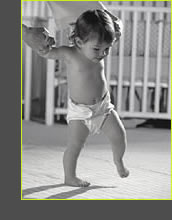 
The basic grammar of human movement begins before we are born. In utero, tiny undulations from head to tail begin the complex coordination of motor skills that will so occupy an infant and toddler as he or she learns to negotiate the world. Watching a child learn to walk is testament to the physical intelligence--and persistence, of the system as trial and error establishes skill. Further, physical play in childhood greatly expands our range and repertoire, as every aspect of our balance, coordination, and motor skills is challenged. Here, a vocabulary of fundamental movement is developed that serves us for a lifetime-from everyday activities to Olympic level performances.
Investigations and Activities
| · Field Trip |
| |
A visit to the MIT day care to watch babies work to become toddlers.
|
| · A World of Objects |
| |
Curiosity about the world motivates movement; our early interaction with objects forms basic gestures-reach, push, throw-structures the basic grammar of movement. We will explore simple movements in relation to objects to discover how they underlie more complex ones. |
|
     |
|







